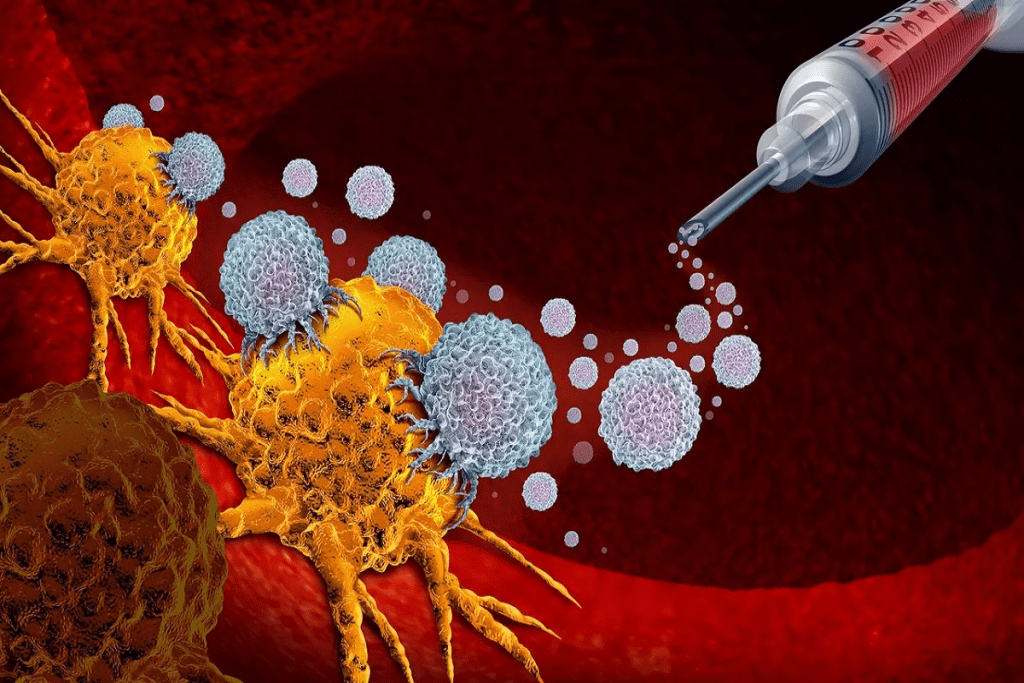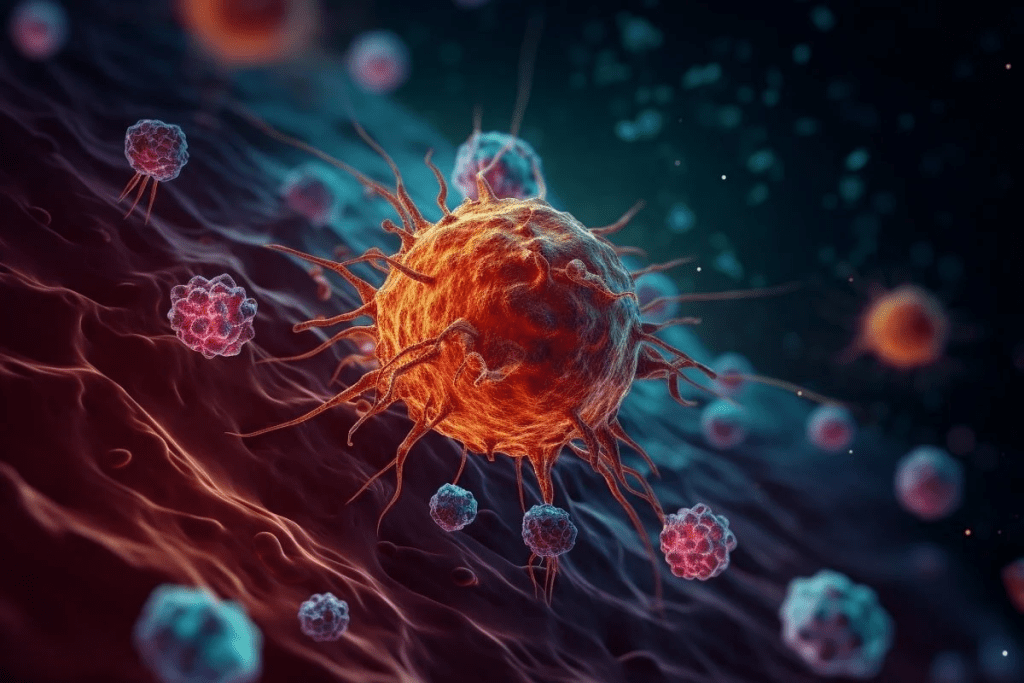
Immunotherapy is a new way to fight diseases, like cancer, by using the body’s own immune system. How much does the Cost of Cancer Vaccine? Understand the dangerous, powerful financial implications of personalized vaccines and treatment costs.
This approach is changing medicine. It’s giving patients new hope and treatment options all over the world.
Immunotherapy helps the immune system fight cancer better. This gives patients a new chance at beating the disease.
Key Takeaways
- Immunotherapy is a cancer treatment that empowers the immune system.
- It offers new possibilities for patients with various types of cancer.
- The immune system plays a critical role in fighting cancer.
- Immunotherapy is revolutionizing modern cancer treatment.
- It provides a more targeted approach to cancer therapy.
1. The Science of Immunotherapy: How It Works
Immunotherapy works by tapping into the immune system’s power to fight cancer. Our immune system is like a shield against infections and diseases. It’s made up of cells, tissues, and organs that protect us.
The Role of the Immune System in Fighting Disease
The immune system is key in finding and getting rid of harmful cells, like cancer. It uses immune cells like T cells and B cells to spot and attack cancer cells. These cells recognize specific markers on cancer cells.
Here’s how the immune system battles disease:
- Recognition: It spots cancer cells as foreign by their unique markers.
- Activation: Immune cells get ready to attack and destroy these cancer cells.
- Elimination: The immune system works to remove cancer cells from the body.
How Immunotherapy Enhances Natural Defenses
Immunotherapy boosts the immune system’s ability to fight cancer. It does this in several ways:
- Checkpoint inhibitors: These therapies let the immune system attack cancer cells without brakes.
- CAR T-cell therapy: This method makes T cells recognize and target specific cancer cells.
- Cancer vaccines: These vaccines help the immune system spot and attack cancer cells.
Immunotherapy strengthens the immune system’s defenses against cancer. This makes it a promising treatment. As research grows, we learn more about using the immune system to fight cancer.

Exploring immunotherapy shows its huge promise in changing cancer care. This treatment can make a big difference in patients’ lives. By understanding how it works, we see its significant impact.
2. Major Types of Immunotherapy Treatments
Immunotherapy has changed cancer treatment a lot. It helps the body fight cancer better. There are many types, each working in its own way.
Checkpoint Inhibitors: Removing the Brakes on Immune Response
Checkpoint inhibitors help the immune system fight cancer. Drugs like Keytruda (pembrolizumab) are very effective. They target specific points, like PD-1, to let the immune system attack cancer cells.
These drugs have greatly improved treatment for some cancers. For example, they work well for:
- Melanoma
- Non-small cell lung cancer
- Renal cell carcinoma
CAR T-Cell Therapy: Engineering Cytotoxic T Cells
CAR T-cell therapy changes T cells to fight cancer. It’s very effective for blood cancers like leukemia and lymphoma.
First, T cells are taken from the patient. Then, they’re changed to find and kill cancer cells. CAR T-cell therapy is a big step forward in cancer treatment.
Cancer Vaccines: Training the Immune System
Cancer vaccines teach the immune system to fight cancer. They’re not like regular vaccines. They’re for treating cancer, not preventing it.
For example, Provenge (sipuleucel-T) is a vaccine for prostate cancer. It’s a way to keep the immune system ready to fight cancer for a long time.
Monoclonal Antibodies and Cytokine Therapies
Monoclonal antibodies are made to help the immune system fight cancer. They can be used alone or with other treatments.
Cytokine therapies use proteins to help fight cancer. Interleukins and interferons are examples. They boost the immune system’s fight against cancer.
These treatments offer hope for many cancer patients. Knowing about them helps patients and doctors plan better treatments.
3. The Evolution and Success of Immunotherapy

Immunotherapy has changed how we treat cancer. It has deepened our understanding of cancer and opened up new ways to fight it.
Milestone Developments in 2011
Immunotherapy has made big strides, with over 150 FDA approvals for cancer treatments. These breakthroughs have ushered in a new era in cancer care, giving patients more choices and better results.
The introduction of checkpoint inhibitors, like Keytruda, has been a major achievement. Keytruda helps treat various cancers, including melanoma and lung cancer. But it’s important to know about possible Keytruda side effects, like fatigue and nausea.
Recent FDA Approvals in 2024
In 2024, the FDA approved more immunotherapies, broadening treatment options. This shows the dedication to finding new ways to fight cancer.
New uses for existing treatments and innovative new therapies have been approved. This progress shows the value of ongoing research in immunotherapy.
Breakthrough Cases and Long-term Remissions
Immunotherapy has led to many breakthroughs, with patients enjoying long-term remissions. These successes show the power of immunotherapy in changing cancer treatment.
Managing care with immunotherapy requires a detailed approach. Healthcare teams work with patients to create personalized treatment plans that meet their specific needs.
As immunotherapy keeps advancing, we can look forward to even more groundbreaking treatments. These will bring hope to patients all over the world.
4. Effectiveness Across Different Cancer Types
Immunotherapy works differently for each cancer type. Some cancers respond very well to it. We’ll look at which cancers do best, how survival rates have improved, and what affects treatment success.
Cancers Most Responsive to Immunotherapy
Some cancers respond well to immunotherapy. These include:
- Melanoma: This aggressive cancer has seen big improvements with immunotherapy.
- Lung Cancer: Non-small cell lung cancer has also shown good results.
- Renal Cell Carcinoma: This kidney cancer has benefited from immunotherapy.
- Bladder Cancer: Immunotherapy is a promising treatment for advanced bladder cancer.
Studies show these cancers have better outcomes with immunotherapy. It acts as an immune system booster. For example, a study in a top journal showed immunotherapy’s success in treating these cancers effectively.
Five-Year Survival Rate Improvements
Immunotherapy has greatly improved five-year survival rates for many cancers. For instance:
- Melanoma: Survival rates for advanced melanoma have jumped from about 10% to over 50% in some cases.
- Lung Cancer: Immunotherapy has also raised the five-year survival rate for non-small cell lung cancer.
These gains highlight immunotherapy’s power to improve long-term survival. Experts say, “Immunotherapy has changed cancer treatment, giving patients new hope for long-term survival.”
“Immunotherapy represents a paradigm shift in cancer treatment, providing hope for patients with previously limited options.”
Expert Opinion
Factors Affecting Treatment Response
Several factors impact how well immunotherapy works. These include:
- Genetic Mutations: Certain genetic changes can affect a cancer’s response to immunotherapy.
- Tumor Microenvironment: The makeup of the tumor environment is key to immunotherapy’s success.
- Patient Health: A patient’s overall health and immune system are vital for treatment response.
Knowing these factors helps in creating personalized treatment plans. As research advances, we can better tailor treatments. This might include therapies targeting specific mechanisms, like himeno and imine in cancer research.
5. Combining Immunotherapy with Other Treatment Approaches
Immunotherapy is changing how we fight cancer. It works better when paired with treatments like chemotherapy and radiation. This mix offers a stronger way to battle cancer.
Immunotherapy with Traditional Cancer Treatments
Immunotherapy is now often paired with other cancer treatments. For example, Keytruda (pembrolizumab) is used with chemotherapy for some cancers. This combo has shown great results in helping patients.
A study in the Journal for ImmunoTherapy of Cancer here found big improvements in survival and quality of life. This is when immunotherapy is used with other treatments.
Navigating Care: Creating Personalized Treatment Plans
Creating treatment plans that fit each patient is key. We look at their health, cancer type, and how they’ve reacted to treatments before. This makes care more effective.
- Assessing patient health and cancer type
- Developing a tailored treatment plan
- Monitoring patient response and adjusting treatment as needed
Personalized care leads to better results and a better life for patients. It’s all about tailoring treatment to each person.
Managing Side Effects and Immune-Related Adverse Events
Immunotherapy can be very effective but also has side effects. It’s important to manage these to ensure the best results for patients.
- Identifying possible side effects early
- Using strategies to lessen side effects
- Keeping a close eye on immune-related issues
By managing side effects well, we help patients handle treatment better. This leads to better outcomes.
6. Conclusion: The Future of Immunotherapy
Looking ahead, immunotherapy’s future in cancer treatment is bright. Ongoing research in immunology will keep shaping how we fight cancer. Personalized therapy, made just for each patient, is a big hope for better results.
Immunotherapy boosts the immune system, helping it fight cancer better. This approach has shown great promise in treating cancer. It works by making the body’s defenses stronger against cancer cells.
Cancer care will get more advanced, with immunotherapy leading the way. As we learn more about how the immune system and cancer interact, we’ll see better treatments. These will be more targeted and effective.
Immunotherapy could lead to longer remissions and better survival rates. It’s set to be a key part of cancer treatment for many years.
FAQ
What is immunotherapy, and how does it work?
Immunotherapy is a cancer treatment that uses the immune system to fight cancer. It boosts the body’s defenses to spot and attack cancer cells. This is done through various methods like checkpoint inhibitors, CAR T-cell therapy, and cancer vaccines.
How does Keytruda work as an immunotherapy treatment?
Keytruda is a checkpoint inhibitor. It removes the brakes on the immune system. This lets cytotoxic T cells attack cancer cells more effectively.
What are the different types of immunotherapy treatments available?
There are several immunotherapy treatments. These include checkpoint inhibitors, CAR T-cell therapy, cancer vaccines, and monoclonal antibodies. Each type helps the immune system fight cancer in its own way.
References
- Ott, P. A., Hu, Z., Keskin, D. B., Shukla, S. A., Sun, J., Bozym, D. J., … & Wu, C. J. (2017). An immunogenic personal neoantigen vaccine for patients with melanoma. Nature, 547(7662), 217“221.https://www.nature.com/articles/nature22991
- Li, X., Xu, H., Xue, W., & Wei, W. (2024). Emerging strategies in cancer immunotherapy: Expanding horizons and future perspectives. International Journal of Molecular Immuno-Oncology, 9(1), 24“38.https://ijmio.com/emerging-strategies-in-cancer-immunotherapy-expanding-horizons-and-future-perspectives/
- Sahin, U., & Türeci, Ö. (2018). Personalized vaccines for cancer immunotherapy. Science, 359(6382), 1355“1360.https://science.sciencemag.org/content/359/6382/1355



































